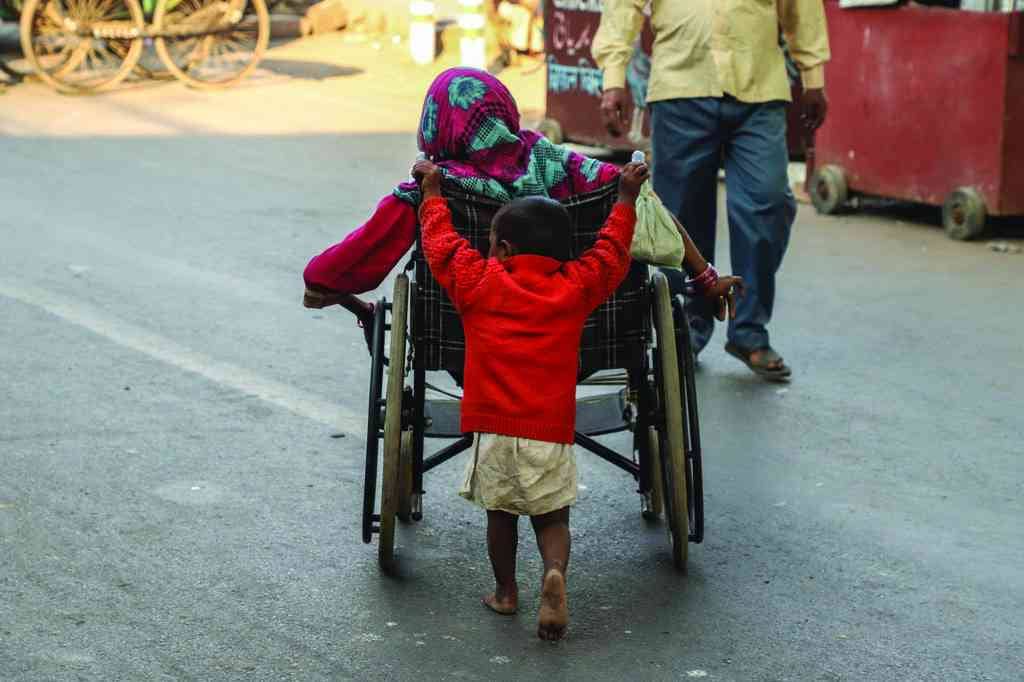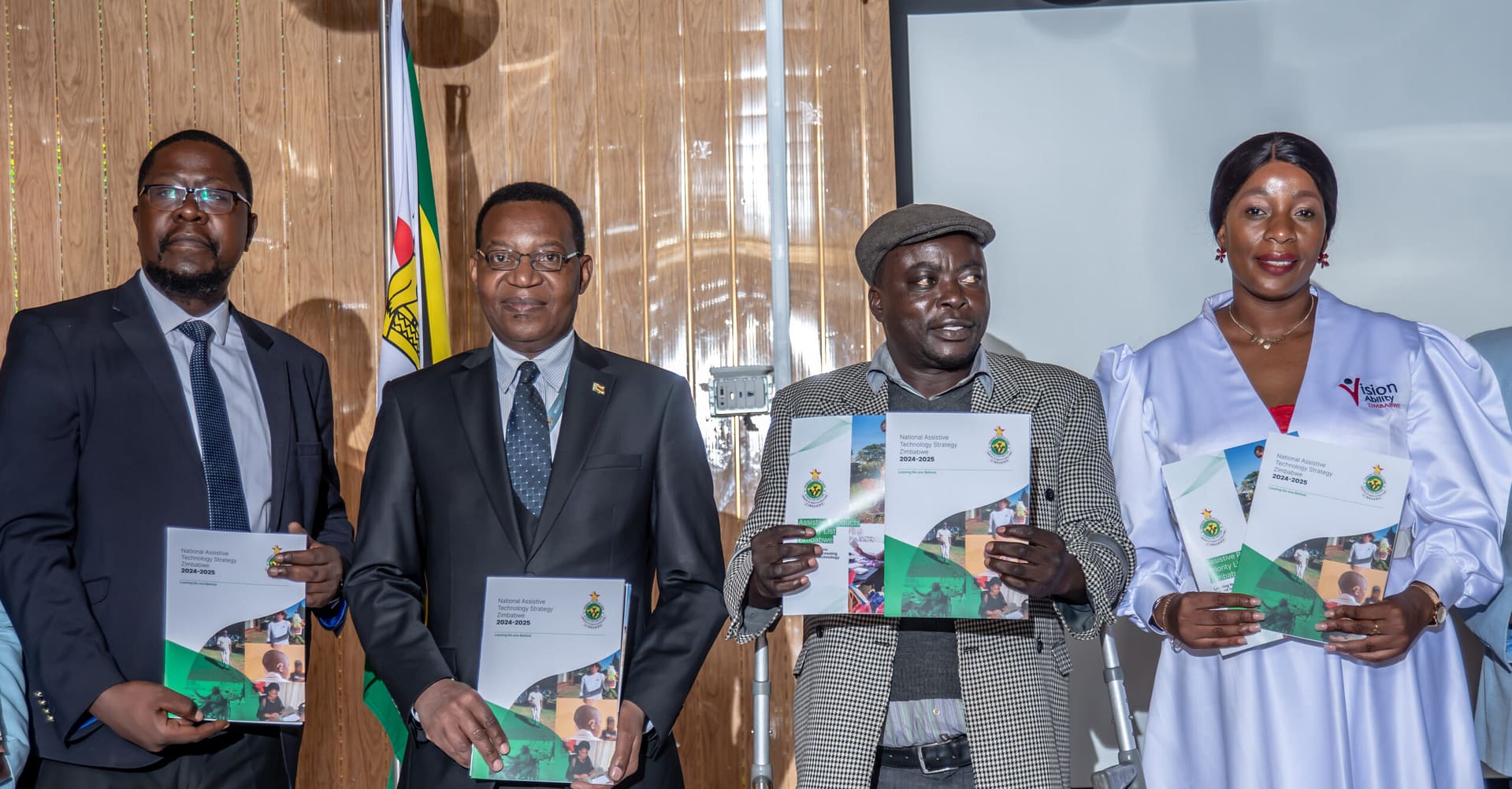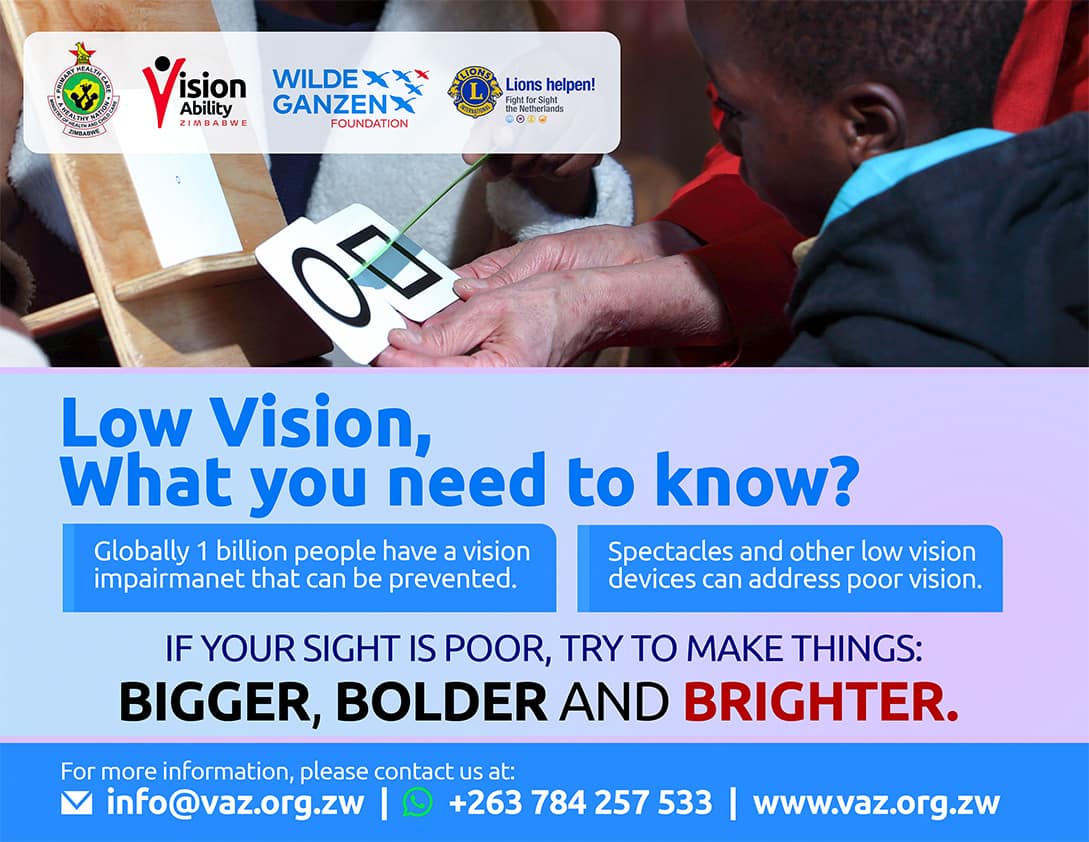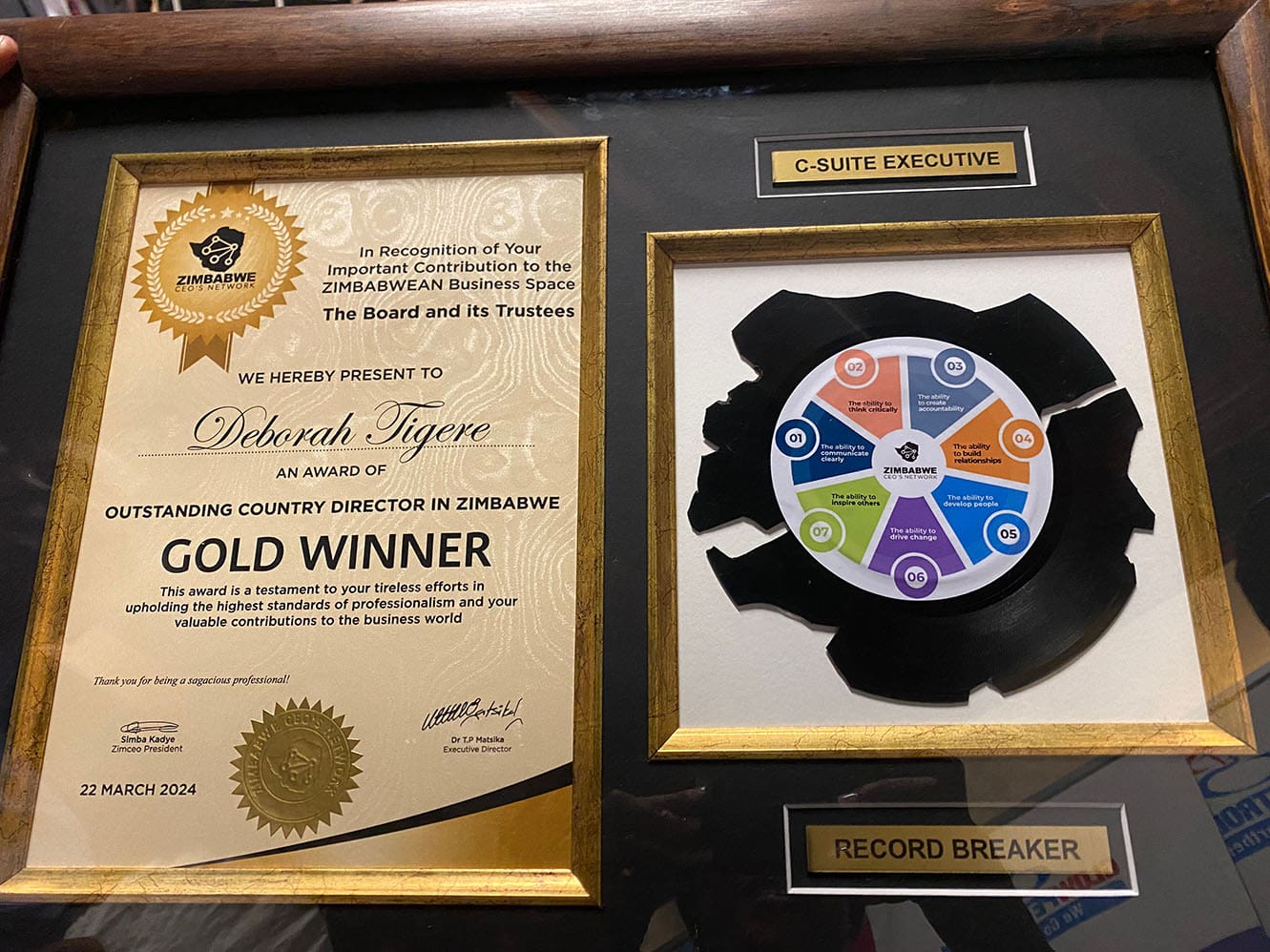Financial inclusion for people with disabilities
HISTORICALLY people with disabilities have been excluded from accessing formal financial services due to high levels of unemployment, poverty and lack of information.
People with disabilities are more likely to have lower income and experience barriers accessing formal employment, making it harder to meet the minimum requirements associated with financial services.
There are several barriers that hinder access to financial services and systems by people with disabilities and these include, physical accessibility of financial institutions, banking facilities and automated machines.
While several banking facilities are automating most of their services, there is need to ensure accessibility of such services considering the different impairments.
People with cognitive, hearing or visual impairments often struggle to access digital banking platforms, applications and websites.
In some cases, services and products do not cater for the needs of people with disabilities, for example insurance policies might overlook the risks associated with disability.
People with disabilities face challenges accessing credit due to the perceived higher risk by financial institutions that have led to the denial of loans.

The discrimination and bias experienced by people with disabilities in financial institutions has hindered equitable access to financial opportunities.
Financial service providers lack awareness and understanding of the diverse needs of people with disabilities leading to inadequate support and service provision.
The documentation to be completed in accessing financial services is complex and inaccessible particularly for those with cognitive disabilities and literacy challenges.
The high cost of assistive technology needed to access financial services has been a major hinderance and information about financial products and services has not been provided in accessible formats, such as braille, easy read or sign language.
Most people with disabilities face digital exclusion.
They also have limited access to information and digital services.
Financial inclusion ensures that people with disabilities have equal access to financial services, which is important for their independence, economic stability and overall well-being.
It enables them to participate fully in society, facilitating for them to save, invest and manage their finances, reducing their reliance on others.
Through access to financial services, such as banking and insurance, people with disabilities can manage their daily living expenses and facilitate access to other services, such as health, education and technology, which enhances their daily living.
The Zimbabwe National Disability Policy emphasises the importance of taking effective measures that eliminate practices that restrict or deny people with disabilities control of their own financial affairs but enable and ensure equal access to bank loans and other financial credit.
The conditions for providing financing must consider the fact that people with disabilities are generally poor and may not have the assets to provide collateral.
Furthermore, disability must be mainstreamed in micro- finance facilities and services, thereby encouraging people with disabilities and their families to engage in various investment programmes.
Financial inclusion helps to break the disability poverty cycle through the provision of resources that build their financial resilience.
Financial inclusion promotes social inclusion, ensuring that people with disabilities are not excluded from financial systems and services.
The Reserve Bank of Zimbabwe, National Financial Inclusion Strategy (NFS2, 2022-2026) emphasises the need to address the barriers and challenges that people with disabilities and other marginalised groups face in accessing financial services.
The National Financial Inclusion Strategy has embraced the definition of disability as outlined in the Convention on the Rights of Persons with Disabilities (CRPD). Therefore, access to financial services is a fundamental right for people with disabilities and will support them in realising their potential and autonomy.
The strategy highlights the barriers faced by people with disabilities as follows: lower digital financial literacy, lack of trust in formal financial institutions, lack of requisite collateral, geographical distance from service providers, unfair market prices, and perceived risk by financial institutions, discriminatory norms and policies that lead to stigma, among other barriers.
To mitigate these barriers, several strategies that promote financial inclusion among people with disabilities are proposed.
People with disabilities need to access a range of financial services and products to cater for their diverse needs.
Therefore, efforts made to promote financial inclusion should take into account the social, economic and cultural factors that lead to financial exclusion.
A public and private collaboration is imperative in facilitating financial inclusion through the provision of supportive and accessible infrastructure.
Financial institutions must be fully accessible, and this can be achieved through installation of ramps, providing accessible parking and facilitating low-height counters that accommodate wheelchair users among other adaptations.
Digital banking platforms, websites and applications should be made accessible to people with disabilities in line with content accessibility guidelines, which may include features, such as simple navigation, screen readers or voice commands.
Financial products should meet the needs of people with disabilities and can be tailor-made to consider their income patterns and potential risks, for example customised stationery.
Assistive technology plays a major role in providing financial services to people with disabilities and this may include artificial intelligence and chatbots to bridge the communication and information gap.
Financial institutions should make an effort to collect disaggregated data by age, gender and type of disability.
Collecting such data will guide the planning and design of financial inclusion interventions relevant to the needs of the population.
Financial literacy programmes are essential as they help to build the capacity of people with disabilities on financial skills. Financial education should be provided in accessible formats and financial institutions should provide training for their staff on disability inclusion to enhance their understanding on specific needs and how to communicate effectively.
On the other hand, people with disabilities should provide feedback to financial institutions and share experiences on financial services and products.
It is important to involve people with disabilities in the development, implementation and monitoring of the financial inclusion strategies to ensure the specific needs are identified and addressed, to increase uptake and usability of services, foster innovation and to promote equal opportunities.
By taking these actions, people with disabilities will access services and take an active role in shaping an inclusive financial system that supports their needs.
Financial inclusion is a key driver for attaining the sustainable development goals because it directly supports poverty reduction, economic growth and social equity.
Low Vision Training for Sekuru Kaguvi Eye Hospital Health Personnel
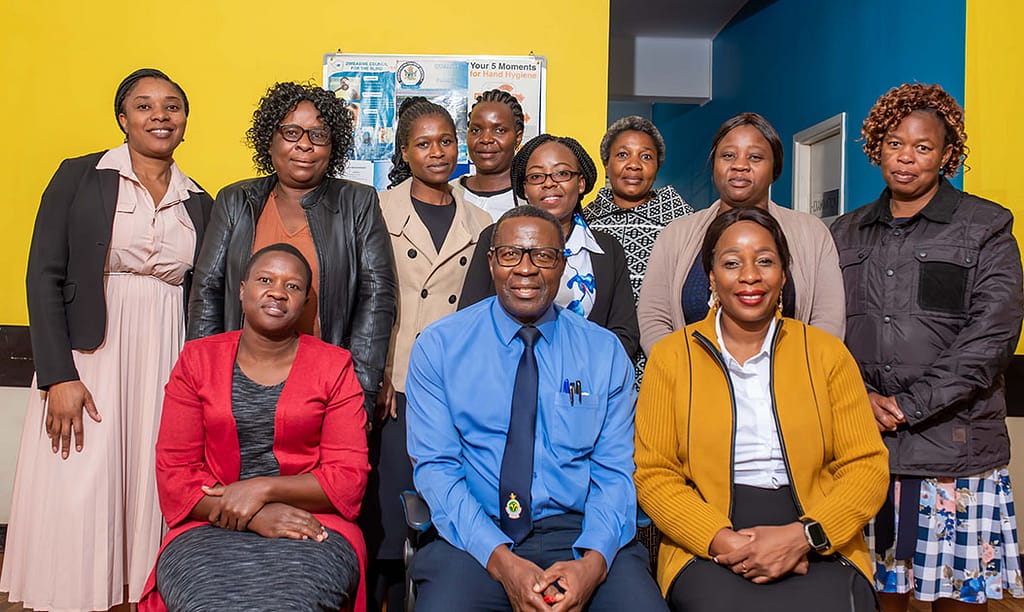
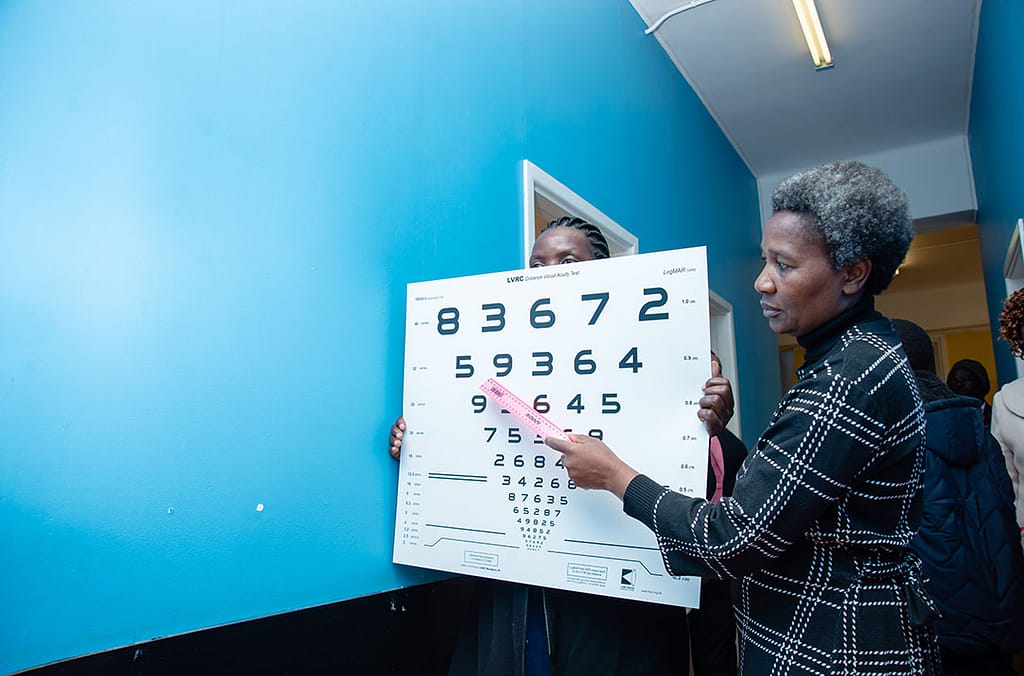
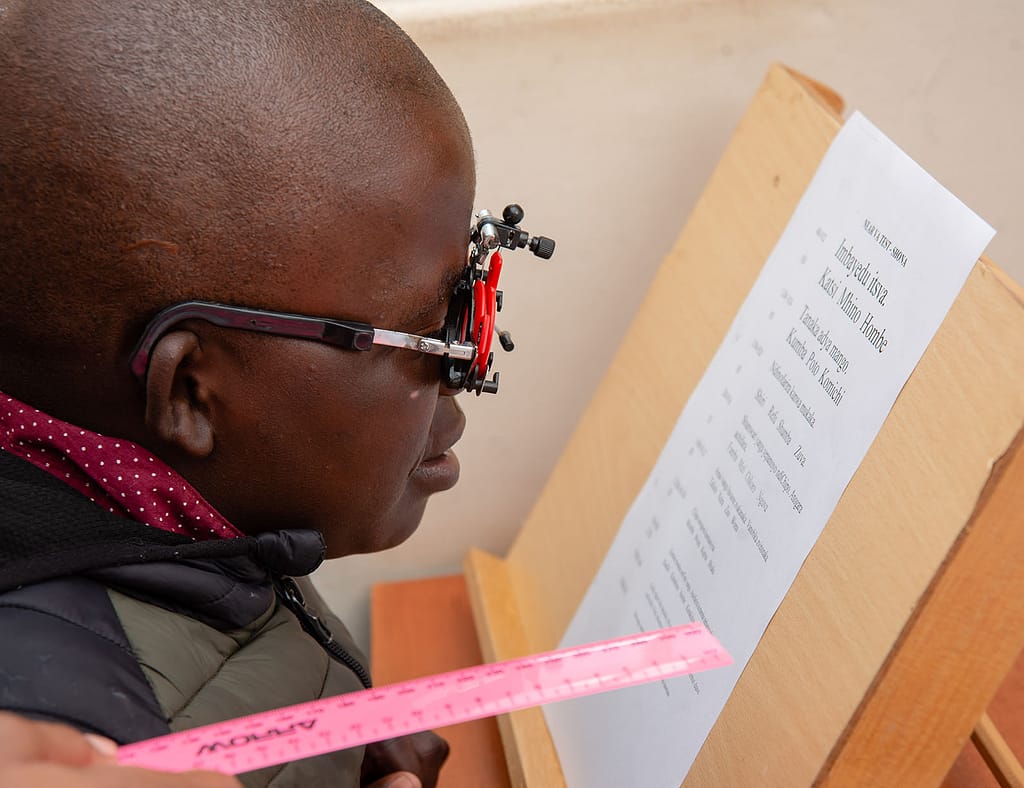
Recently, Sekuru Kaguvi Eye Hospital Ophthalmic Nurses participated in a basic low vision training program aimed at equipping the health personnel with the expertise to provide comprehensive low vision care to children and adults.
Low vision is a result of health conditions and eye diseases such as macular degeneration, cataract, glaucoma, birth defects and eye injuries among others. People with low vision usually find it difficult to perform everyday tasks despite wearing spectacles, having surgery or using medication. One may experience challenges recognizing faces, reading or appreciating height and depth among other challenges. To enhance the understanding of low vision care for children and adults, the training sessions focused on understanding the causes and prevalence of low vision, further delving into assessments and equipping the eye health personnel with the knowledge of prescribing and teaching use of low vision devices. In addition, the training emphasized the importance of a thorough refraction including non-optical interventions, and environmental adaptations which are essential in the provision of comprehensive low vision care.
As outlined in the National Eye Strategy (2021 – 2025), several people fail to access eye care services due to the high cost of services and assistive technologies including the lack of knowledge on eye conditions and services available. Therefore, strategies should be adopted to make eye care services accessible and affordable in addition to raising awareness in society about the importance of seeking eye health services early. The basic low vision training will strengthen the capacity of eye health professionals to identify and diagnose eye conditions at an early stage, allowing timely intervention and treatment.
Disability and poverty are closely linked
People with disabilities are among the poorest and most marginalised, accounting for as many as one in five of the world’s poorest, according to the World Bank estimates.
Disability is a cause and consequence of poverty.
The Convention on the Rights of Persons with Disabilities (CRPD) recognises that the majority of people with disabilities live in conditions of poverty and emphasises the need to consider the rights and needs of people with disabilities to reduce poverty among them.
Disability and poverty are closely linked and have a huge impact on the level of inclusion in society and the achievement of the sustainable development goals.
Disability is cause of poverty because people with disabilities experience significant challenges in accessing education and employment opportunities hence, they are more likely to live in poverty than those without disabilities.
The negative experiences have been exacerbated by the stigma and discrimination, lack of workplace accommodations that prevent people with disabilities to participate on an equal basis as others in society.
Such experiences have led to higher rates of unemployment and underemployment among people with disabilities worsening their financial difficulties.
They struggle to meet their basic living expenses, and the opportunity to earn adequate income is almost non-existent.
Generally, poverty is associated with poorer health access across all populations. However, the additional costs associated with disability can strain the financial situation of people with disabilities.
Disability often requires ongoing medical and rehabilitation services and managing such health conditions is costly and time consuming impacting the ability to work.
In addition, resources are required to support assistive technologies and specialised services making it harder to escape poverty.
In most cases people with disabilities forego, the required support services which affects their quality of life.
Social and economic exclusion has limited social capital, and resources that are critical in enhancing their ability to find jobs, receive support and access services.
Access to quality education by people with disabilities is limited due to physical barriers and the lack of inclusive systems, policies and practices that lower their chances of attaining education, and employment further perpetuating the cycle of poverty.
Lack of accessible transport has limited the ability of people with disabilities to travel for education and work.
The support of carers is essential, however, it results in forgone family income as caregivers or family members assist the individual with a disability preventing the opportunities to earn income.
The inadequate social safety nets and support systems such as disability grants, community support and social assistance will make it difficult for a person with a disability to meet their needs.
Disability is a consequence of poverty because, poverty can lead to disability forming a cyclical relationship where one influences the other.
People living in poverty are more likely to experience health problems as they experience limited access to health services and the lack of preventative care.
Insufficient or missed health interventions can result in the progression of some health conditions into disabilities.
For example, avoidable causes of blindness such a cataract if not treated can lead to blindness. Poor nutrition can lead to developmental issues that can cause physical or cognitive disabilities.
Poverty increases the vulnerability to infectious diseases due to poor sanitation, exposure to pollution, lack of treatment, overcrowded living conditions and hazardous workplaces which can lead to chronic illnesses and disability.
Most mental health conditions are associated with poverty leading to disability. Further, diseases such as Malaria and HIV/Aids can lead to long term disabilities.
Recommendations
The implementation of inclusive policies will make a difference in promoting the rights and inclusion of people with disabilities in society.
Disability is a social construct; therefore, society has a big role to play in addressing disability and poverty.
Effort must be put to ensure that people with disabilities meaningfully and effectively participate in development processes to break the vicious poverty and disability cycle.
In order to achieve this goal, various strategies need to adopted and these include, improving their living conditions, facilitating access to health and education services, provision of reasonable accommodation and facilitating access to empowerment programmes among other interventions.
Social protection programmes such as social security, disability benefits, respite care and counselling should be expanded to support individuals with disabilities and their caregivers.
Social protection is essential in reducing the vulnerability experienced by people with disabilities, improving their health and economic status.
The National Disability Policy highlights the importance of facilitating social protection programmes to alleviate poverty among people with disabilities and the issuance of disability cards for easy identification and access of social protection services including health care is imperative.
Access to education and skills development is key in promoting disability inclusion and active participation, therefore, learning institutions should be accessible and inclusive, providing assistive technologies and adaptive learning materials.
Access to information empowers people with disabilities to make informed decisions and choices about their lives including health care, education and employment.
Employers should be encouraged to adopt inclusive hiring practices and promote accessible work environments that enable people with disabilities to achieve their full potential.
Advancing health equity for people with disabilities can be achieved by addressing the factors that disadvantage people with disabilities from accessing health services and these factors relate to the social, economic and political context including stigma and discrimination.
Health services should be made affordable and accessible to provide for rehabilitation, assistive technologies to improve the wellbeing and productivity of people with disabilities.
For the programs and interventions to be effective, it is imperative to collect and analyse socio-economic challenges experienced by people with disabilities.
In addition, the collection of disability disaggregated data will inform policies and programmes targeted at improving the lives of people with disabilities.
Poverty must be confronted to break the dependency chain harnessing people with disabilities, hence the importance of looking beyond income and employment to include access to opportunities and other services that significantly improve the lives of people with disabilities.
Inequality and poverty are closely linked, therefore addressing inequality of opportunities experienced by people with disabilities will address poverty.
People with disabilities must be empowered to access opportunities and be involved in decision making, fostering an inclusive society where they can thrive.
Ending poverty must be supported by different strategies that promote economic growth and address the diverse social needs including education, health, social protection and employment.
Tigere is a development practitioner and writes in her personal capacity.
Government Launches National Assistive Technology Strategy and Assistive Products Priority list for People with Disabilities
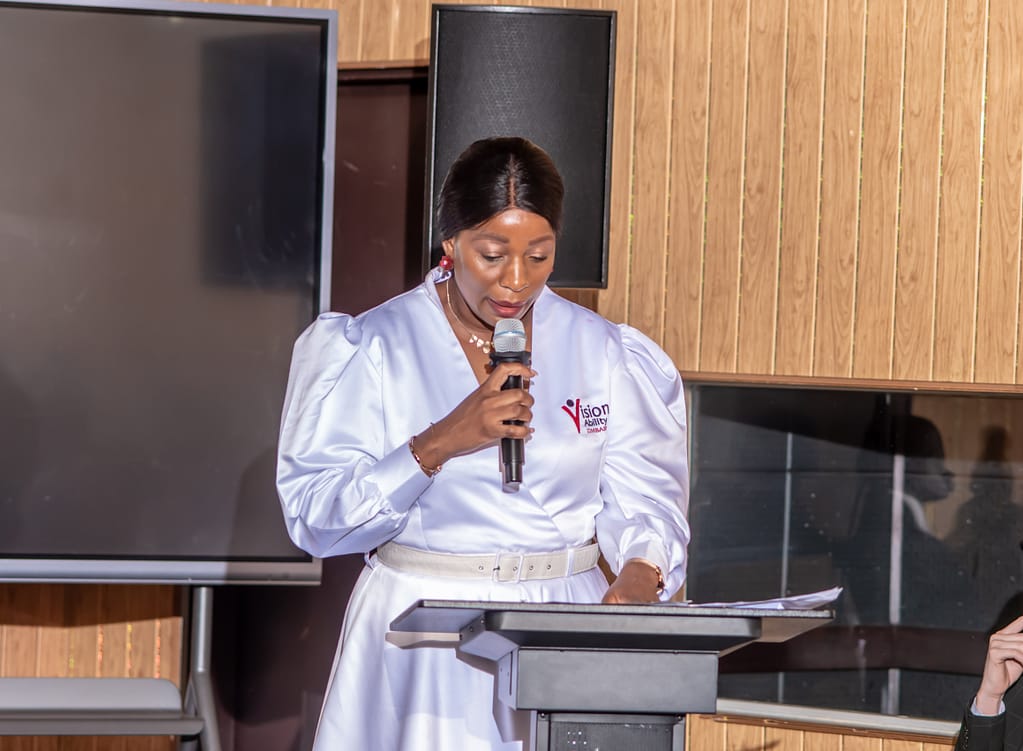
The Government of Zimbabwe, on Friday 24 May 2024, made a historic announcement in Harare,
launching the National Assistive Technology Strategy and Assistive Products Priority List for people with
disabilities. The Assistive Technology (AT) Strategy for Zimbabwe outlines a comprehensive road map to
enhancing access, availability, and utilization of AT devices and services across the country.
It recognizes the importance of AT in promoting the inclusion and well-being of persons with
disabilities, older adults, and individuals with functional limitations. The strategy also addresses the
existing challenges faced in Zimbabwe, including limited affordability, weak governance, inadequate
funding, fragmented supply chains, and a shortage of skilled personnel. This event was attended by the
government dignitaries, representatives from Civil Society Organizations (CSOs), Organizations of
Persons with Disabilities (OPDs) among other stakeholders. Vision Ability Zimbabwe in collaboration
with other stakeholders participated in the development and launch of the strategic documents. The
development process was led by the Clinton Health Access Initiative with support from USAID.
This strategy and Assistive Products Priority List will ensure that assistive technology reaches those who
need it most, empowering individuals with disabilities to reach their full potential. The strategy further
outlines a comprehensive approach to increasing access to assistive technology, including among many
others: mobility aids like wheelchairs and prosthetics, communication devices like braille displays and
speech-generating devices and visual aids like magnification software and adaptive glasses. Access to
quality assistive technology (AT) in Zimbabwe is challenging due to various factors that are common in
less resourced settings. These challenges include the unaffordability of AT, weak governance,
inadequate domestic funding for AT, limited regulatory capacity, fragmented supply chains, and a
shortage of skilled personnel.
Additionally, the lack of research and data on AT needs, unmet needs, service quality, costs, and
benefits further hinder access to appropriate AT services. Currently, in Zimbabwe, only a small
percentage of those in need of assistive technology have access due to challenges such as high costs,
limited availability, inadequate financing, and a lack of awareness.
Author: Macdonald Mudzaki
Ableism perpetuates inequality
Ableism is discrimination or prejudice against individuals with disabilities, where they are valued as less than others and rendering them invisible.
PEOPLE with disabilities continue to experience discrimination in several areas hence it is important to understand how discrimination occurs.
Ableism is discrimination or prejudice against individuals with disabilities, where they are valued as less than others and rendering them invisible.
Whether conscious or unconscious, ableism manifests in the form of marginalisation, stereotyping or exclusion of people with disabilities from opportunities or activities.
Society discriminates individuals with disabilities based on their ideas in terms of what they perceive as normal, fit, desirable, and productive.
It is assumed that an individual with a disability has a deficit that needs to be addressed and the systemic oppression leads to physical, environmental, and attitudinal barriers that exclude people with disabilities.
Like other ‘isms’ ableism is prevalent and harmful, woven in society to the extent that it is not immediately obvious. It occurs at individual and systemic levels leading to inequality and denial of rights and opportunities for people with disabilities.
At interpersonal level, individuals disrespect people with disabilities because of their disability by using derogatory language, deliberately excluding them from activities, dismissing their requests and treating them as objects of pity.
At institutional level, systems and infrastructure are inaccessible for people with disabilities. Institutional policies and practice may perpetuate inequalities. Article 5 of the Convention on the Rights of Persons with Disabilities (CRPD) recognises that all persons are equal before and under the law and all discrimination on the basis of disability shall be prohibited.
- Makanda believes anything is possible
- We are all entitled to human rights, says Mudiwa
- Let’s not leave people living with disabilities behind
- Child brides: Machaya saga opens Pandora’s box
Ableism manifests in society through failure to employ or provide workplace reasonable accommodation. Other examples include inaccessible infrastructure such as narrow entrances, narrow restrooms, or damaged footpaths.
People with disabilities experience inequalities in accessing services. Compared to people without disabilities, people with disabilities are significantly and more likely to experience stigma and discrimination in accessing education and health services by preventing, delaying, and denying them the essential services.
The consequences of ableism are that people with disabilities will lose their freedom, choice, mobility, and opportunities. Ableism perpetuates the oppression of people with disabilities hindering their full participation in society.
A discriminatory environment leads to lack of accommodations, increased rate of unemployment and poverty among people with disabilities.
The exclusion, lack of recognition or acceptance contributes to loneliness, stress, depression, and hopelessness. It is, therefore, imperative to also note examples of everyday ableism, such as assuming that a person with a disability suffers from a certain condition and not capable of performing any tasks.
More often, people never ask what a person with a disability requires and impose actions based on their views. Some people believe that disability must be visible and such misconceptions are regarded as ableism.
Society should be conscious about using the appropriate language as some of the language that is used produces ableists assumptions, although unintentional it is harmful and offensive.
For example, we sometimes challenge a person with a disability about their disability or disclosure. There are many invisible barriers built in the structure of society, which are discriminatory and offensive, and some of these barriers have developed into individual and organisational habits.
As a result, a number of people with disabilities decide not to respond to ableist comments. They may choose to go to other accessible facilities if they have an option or stay indoors leading to social isolation.
When individuals with disabilities begin to internalise ableism, they start to believe the negative massages that they receive during interaction.
Due to the continuous experiences of exclusion and discrimination, some people with disabilities release their feelings of frustration and confront ableism.
Although debatable expressing the feelings of anger or frustration is considered an advantage rather than harbouring the feelings of unworthiness.
Such expressions need to be handled with care as it may harm relationships and alienate the people that individuals with disabilities rely on for support and care.
It is important to address ableism because everyone deserves to be treated with dignity and respect, regardless of their abilities. People with disabilities have the same rights as everyone, and addressing ableism will ensure that these rights are protected and upheld. To challenge ableism, society should adopt inclusive practices and avoid excluding people with disabilities or singling them out in activities.
Discrimination and stigma negatively impact the wellbeing of individuals with disabilities hence, addressing ableism will create a supportive environment that benefits everyone’s mental and emotional well-being.
The voice, choice, and autonomy of people with disabilities is key in achieving an inclusive society. Therefore, it is important to educate society on disability issues and learn how to interact with people with disabilities.
Understanding the intersecting identities experienced by people with disabilities enables society to appreciate the different views and to be respectful of individual experiences.
Disability is heterogenous and there is no one size- fits all. Therefore, embracing diversity and the diverse abilities promotes a culture of inclusivity.
Society should be aware of accessibility challenges and make an effort to address the barriers that hinder full and effective participation of people with disabilities in all aspects of society.
Advocacy is one way of confronting ableism without being too personal. People with disabilities and Organisations of Persons with Disabilities (OPDs) should provide information and highlight the experiences associated with discrimination and accessibility.
In addition, they must provide suggestions on how to meaningfully engage people with disabilities. Ableism can take different forms including harmful language; hence society needs to be aware of the inclusive language to use as a tool for combating ableism.
This includes referring to the person first before the disability, for example, a person with visual impairment, a child with albinism or women with a mental health condition.
A group of people with hearing impairment or deaf are referred to as the deaf community, indicating the identities and the culture. The aim is to communicate respectively in an inclusive manner.
It is important to avoid making assumptions and consult people with disabilities about their preferences and use of appropriate language. Making an effort to address interpersonal ableism will make a difference in breaking the systems that reinforce institutional ableism. Ableism affects the achievement of the sustainable development goals, by hindering access to quality education, limiting employment opportunities, excluding individuals with disabilities from all aspects of society.
The collaboration among various stakeholders and government is essential in effectively addressing ableism, ensuring that no one is left behind in building a just and inclusive society.
Low Vision Affects Quality of Life
A person is said to have low vision if they find it difficult to perform everyday tasks despite using eyeglasses, contact lenses, having medication or undergone surgery. Unlike a person who is totally blind, a person with low vision has some useful vision that can be improved with optical devices. Low vision becomes noticeable when it begins to interfere with the performance of everyday activities and in young children negatively impacting motor, language, emotional, social, and cognitive development with lifelong consequences. Low vision in young children has negative and sometimes irreversible impact on children’s psychological, educational, and social performance, which can persist into adulthood and affect individuals’ quality of life. Helping someone with low vision involves understanding their unique needs and providing appropriate support.
Community Awareness & Low Vision Screening
Last week, Vision Ability Zimbabwe (VAZ) partnered with The Ministry of Health and Child Care, Zimbabwe Albino Association, and The National Council of Disabled Persons of Zimbabwe to host a vital Low Vision Screening event at the Harare Gardens. This intimate gathering aimed to provide essential vision assessments and raise awareness about visual impairments among children and youths in our community.
The event buzzed with warmth and camaraderie as families gathered under the gentle shade of Harare Gardens, with over one hundred children and youths getting screened. Against this picturesque backdrop, our dedicated team of professionals and volunteers worked diligently to conduct thorough vision screenings for attendees.
The event served as an invaluable opportunity to engage with families on the importance of early detection and intervention for visual impairments. Through informative presentations and one-on-one discussions, attendees gained insights into the challenges faced by individuals with low vision and explored avenues for support and assistance.
Here are a few snapshots capturing the essence of our gathering at Harare Gardens:
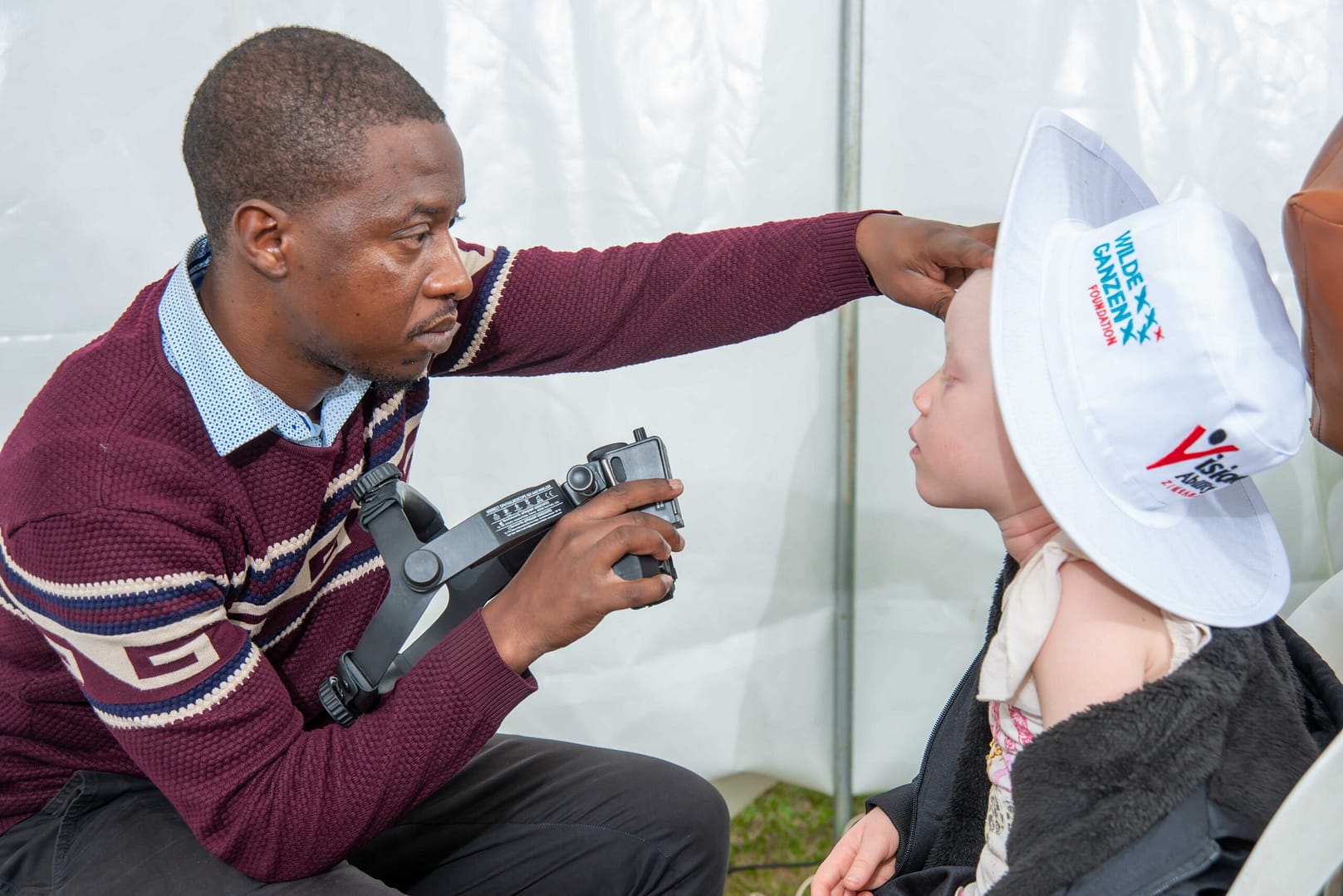
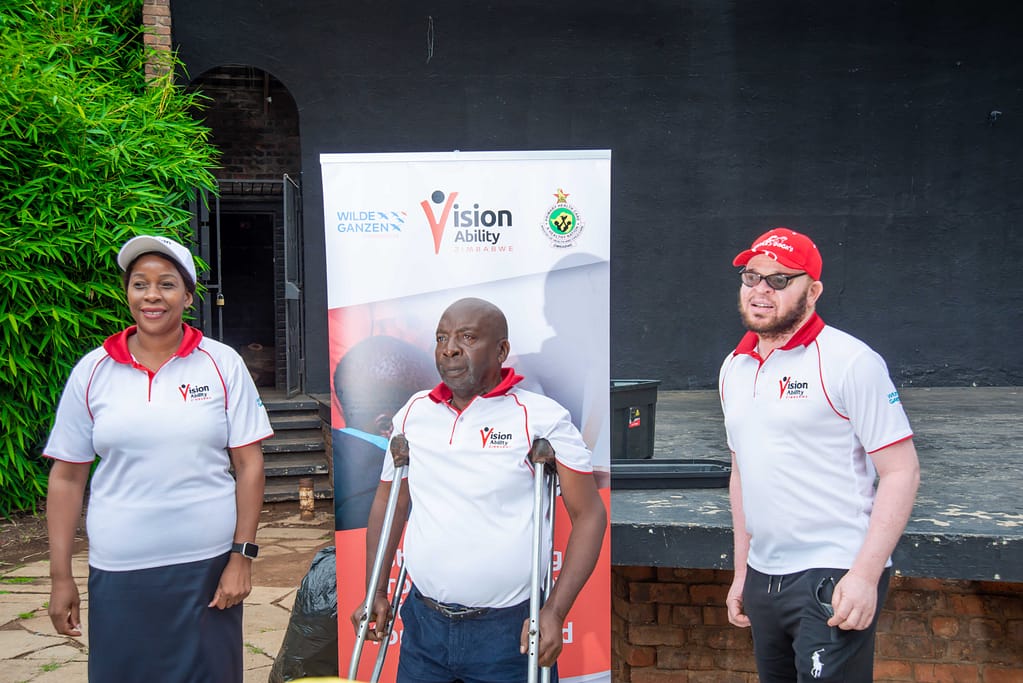
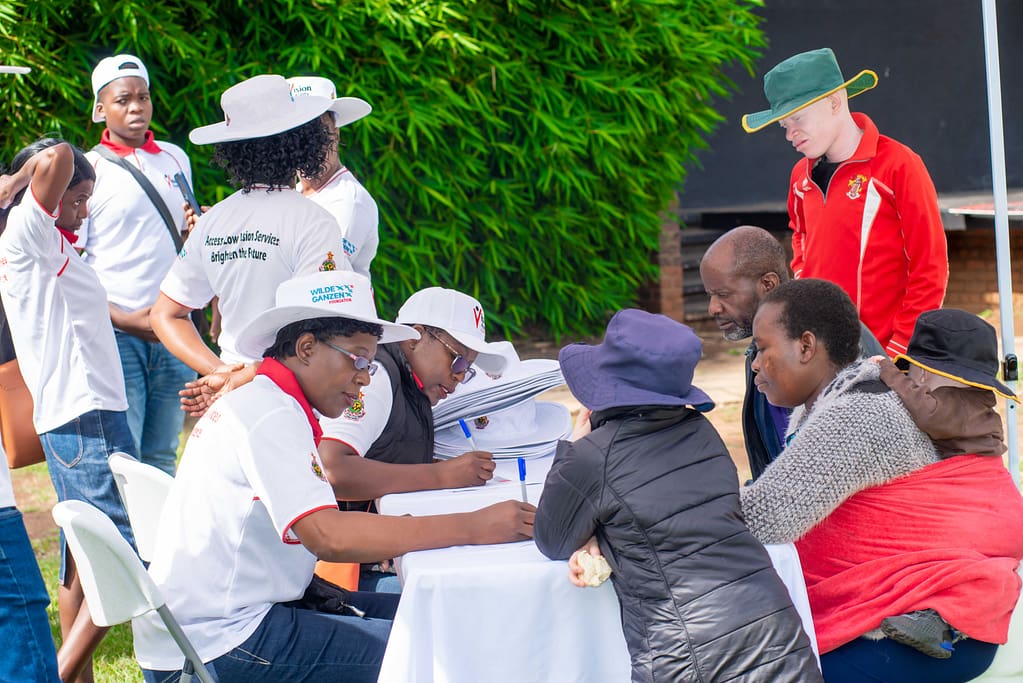
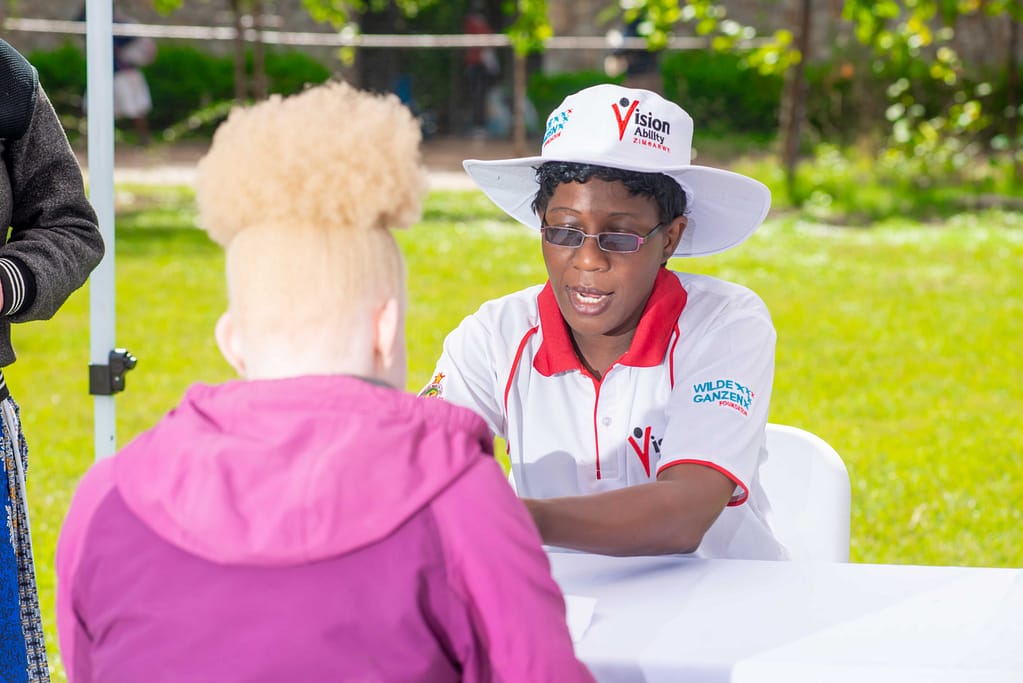
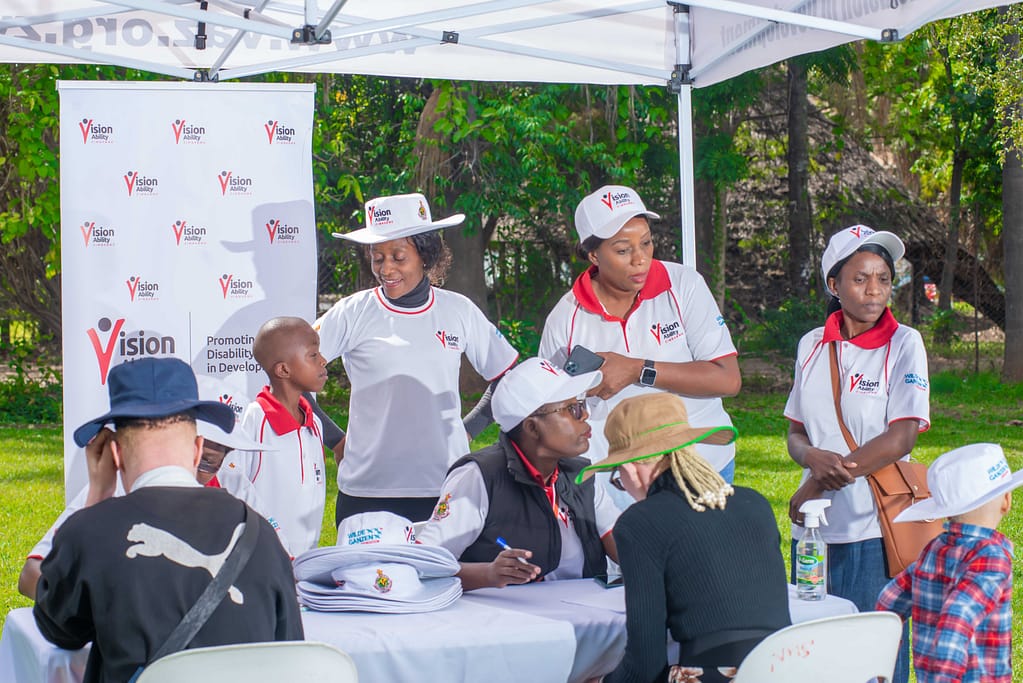
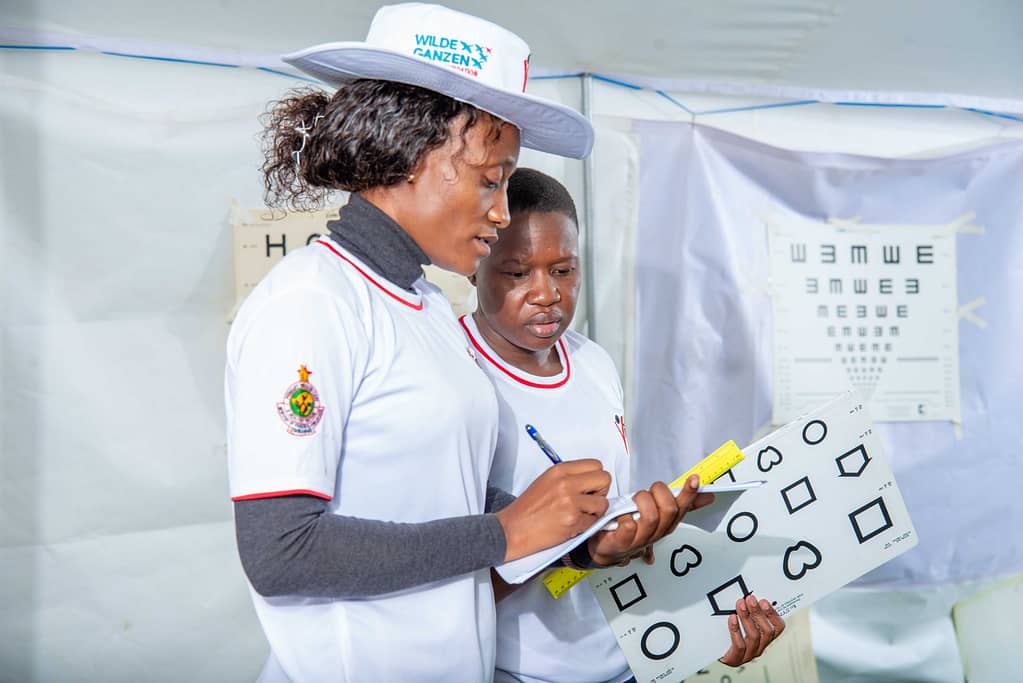
As the day concluded, we reflected on the significance of our collective efforts in advancing disability inclusion and access to essential services. We extend our heartfelt appreciation to all who contributed to the success of this event, from our partners and volunteers to the attendees who entrusted us with their care. Your support fuels our commitment to promoting disability inclusion and ensuring that every individual has access to essential services and support.
At VAZ, we are dedicated to creating a more inclusive and equitable society, one step at a time. Together, let us continue to shine a light on the path towards brighter futures for all.
Celebrating Excellence: Deborah Tigere Honored with Outstanding Country Director Award
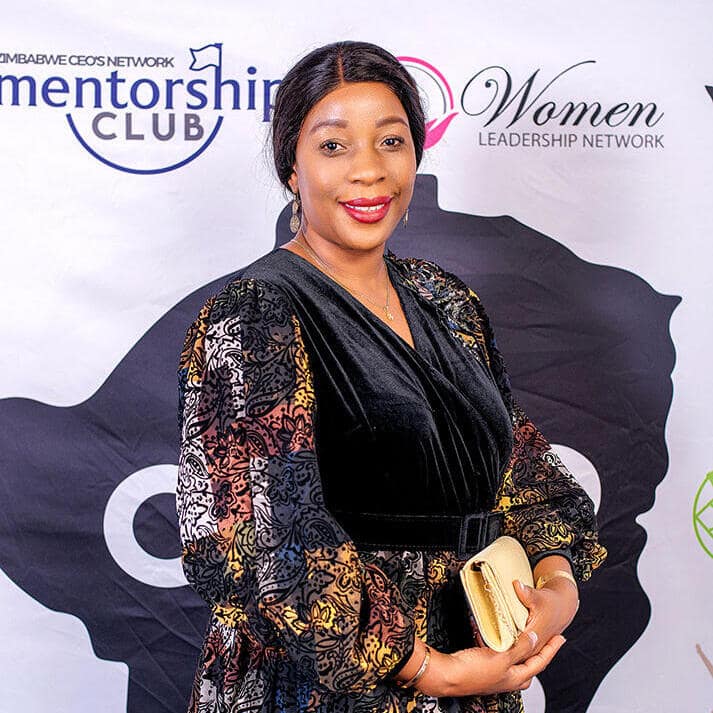
In the realm of leadership, there are those whose dedication, passion, and vision shine brightly, illuminating the path for others to follow. Such is the case with our very own Executive Director, Deborah Tigere, whose recent recognition as the Outstanding Country Director in Zimbabwe has brought immense pride and inspiration to our organization.
In a heartfelt LinkedIn post, Deborah eloquently expressed her gratitude for this prestigious accolade, reflecting on the journey that led her to this momentous achievement. With humility and grace, she acknowledges the blessings in her life and the unwavering support of her mentors who have guided her along the way.
The award, presented by the Zimbabwe CEO’s Network at the C-Suite and Corporate Governance Excellence Awards held from March 20th to 23rd at Elephant Hills Hotel and Conference Centre in Victoria Falls, serves as a testament to Deborah’s exceptional contributions to the Zimbabwean business landscape and society at large.
Deborah’s presence at the awards ceremony was undoubtedly felt as she stood among the elite professionals honored for their exemplary leadership and dedication to excellence. Her commitment to serving vulnerable populations and leaving a legacy for future generations is not only commendable but truly inspiring.
As we celebrate this remarkable achievement, we extend our heartfelt congratulations to Deborah Tigere. Her leadership, passion, and unwavering commitment to our mission have propelled us forward on our journey to creating a more inclusive and equitable society.
Deborah, we are immensely proud to have you at the helm of our organization, and we look forward to continuing to make a meaningful impact under your guidance and leadership. Congratulations once again on this well-deserved recognition.




